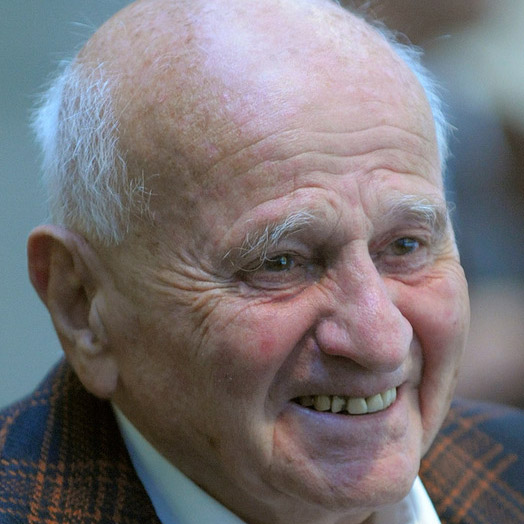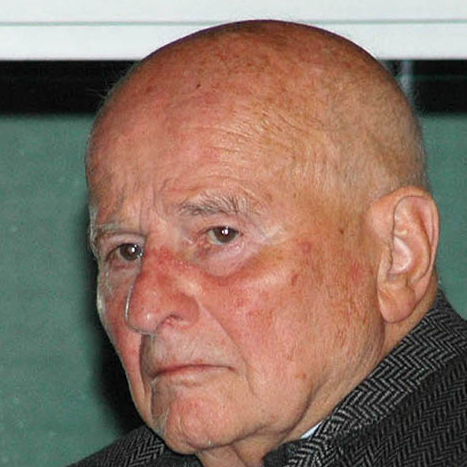|
famology
our family genealogy project |
Wolfgang Pfaundler
-
Name Wolfgang Pfaundler Birth 1 Jan 1924 Innsbruck AT 
Gender Male Death 20 Apr 2015 Piburg, Tyrol AT 
Notes - Wolfgang Pfaundler published the book Der Tiroler Freiheitskampf published by Süddeutsche Verlag in 1809 under Andreas Hofer, numerous illustrated books and several films about Tyrolean customs. For decades he was also the publisher of the Tyrolean cultural magazine Das Fenster. During the Second World War, he fought as a partisan in the Tyrol against the Hitler regime, where he was the initiator and leader of the resistance group in the Ötztal together with Hubert Sauerwein. This was created in 1941 and sat down in 1942 from about 50 people together. In the mountains, the partisans were able to successfully hide from the Nazis until the end of the war and took power in the Ötztal in May 1945, which they then handed over without a fight to the invading Americans.
Pfaundler published South Tyrol's Promise and Reality in 1958, a compendium of diplomatic negotiations and political events in and around South Tyrol since 1919. However, when the reference work failed to mobilize the public for the cause of the oppressed South Tyroleans, Pfaundler resorted to more radical methods His desire for "freedom for South Tyrol" to help. He founded in 1957 - from the 1954 Bergisel-Bund out - the North Tyrolean section of the Liberation Committee for South Tyrol, mostly called "Freedom Legion South Tyrol" (FLS). In December 1960, he laid down his leadership, after ammunition, explosives and weapons were found in his rented apartment, his successor was Heinrich Klier. He said he never detonated bombs. He came rather as a "logistical" helper and advisor on the plan. Pfaundler was accused in 1962 in a Milan explosive process, the fire night of June 1961, in which 37 electricity pylons were blown up organized. As a result, although the Austrian authorities charged with the possession of explosives against him, in the subsequent jury trial, he was acquitted. In Italy, on the other hand, he was sentenced in absentia to twenty years and eleven months imprisonment, after which he could not pass the Italian border for decades, otherwise he would have been arrested. Only in January 1998, the Italian President Oscar Luigi Scalfaro informed the Austrian Federal President Thomas Klestil that he had pardoned four former South Tyrol activists, namely Heinrich Klier, Peter Matern, Wolfgang Pfaundler and Gerhard Pfeffer.
Wolfgang Pfaundler was married to the pianist and author Gertrud Spat (born November 5, 1930 in Eindhoven, (January 19, 2010 in Innsbruck), working as a translator with Mary de Rachewiltz , the daughter of Ezra Pound, and as a novelist with the mother employed by Georg Trakl.
- (Google translated)
Felix Mitterer: On the passing away of Wolfgang Pfaundler
Ross Grind
On April 20, 2015 Wolfgang Pfaundler von Hadermur (as it stands on the party note) died in Ötztal hamlet Piburg. Several years ago, he retired here, cared for by his consort Herlinde Menardi, a folklorist. For three days he was then laid out in the room of the old farm, as was always the custom, but actually no longer allowed. The kids just did it. The Piburger and the Oetzer came to the Rosary. Pfaundler stood high in their respect.
Apart from the legendary governor Eduard Wallnöfer, only Wolfgang Pfaundler is considered to be so much the epitome of the Tyrolean, Tyrolean, and Tyrolean patriots. But that was not his birth. For Pfaundler was born not in Tyrol, but on 1 January 1924 in Vienna, grew up there and went to school. Piburg - that was just the summer residence of the family. His father's name was Hermann Pfaundler and, as a lawyer, head of section in the Federal Chancellery. The mother's name was Gertrud Schönfeld and came from a Jewish Budapest family. As a 14-year-old sees Wolfgang, as the Vienna Nazis force Jewish neighbors to brush the sidewalks on his knees. At school, Wolfgang is called a "Saujud" (Jews' sow). Then the Nazis ask Father Hermann to divorce the Jewish woman. The father refuses, loses his high official position and must feed the family throughout the war with the grant of tutoring. All this characterizes Wolfgang and will lead him to organize the resistance in the Ötztal as a 20-year-old and hiding refugees and deserters in the woody cliffs above Piburg.
On Friday, April 24, at 2 pm, I stand in front of an old grave plate, which is embedded in the cemetery wall of Oetz. Dr. Meinhard von Pfaundler (1872-1947) is buried here, professor of paediatrics in Munich, so famous as a pediatrician, that he was even brought to the Tsar's court. This is a brother of Wolfgang's father. He also loved Piburg very much and built himself a beautiful house in the 1920s directly above the lake, which belonged to him and which he then donated to the community Oetz. The Pfaundleri were thus Tyroleans who went out into the world to become something there. The young Wolfgang Pfaundler came back to become something in Tyrol.
The ancient farm, of which I had always believed that the Pfaundler family had been stuck and proud of it since the Middle Ages at the latest, had not been in the possession of the family for a long time, and Wolfgang passionately fought for him and carefully prepared him.
The Oetz church stands high on a cliff above the village and the climb is steep, very steep. One wonders how old, frail people managed this over the centuries. Many say goodbye to Wolfgang Pfaundler. All Oetz, all of Piburg, the whole Ötztal takes part, and from afar the old friends have come. Many of them are not coming because they have already gone before Pfaundler, as well as the best of all his friends, Paul Flora. There are also rifle companies, including one from South Tyrol, with them Eva Klotz, the daughter of Georg Klotz, the "partisan" among the South Tyrol fighters. Salut will not be fired. This will have upset the Pfaundler a bit.
Later the funeral meal in the Gasthof Piburger See, which is opposite the Pfaundlerhof. You meet people you have not seen for ages. And wonder how old they have become. (One likes to look over his own age.) Over there at the church it was hot as hell, here on the dark side it is almost too cool to sit outside. We tell each other about the Pfaundler.
At the beginning of the seventies I was invited to the Pfaundler-Hof for the first time. And got to know artists for the first time - writers, painters, composers, even architects. Likewise, people from the university like the Germanists Walter Methlagl and Michael Klein. Pfaundler had discovered me and published texts of mine in his legendary half-year magazine "die Fenster". Pfaundler has either discovered or at least greatly encouraged almost all Tyrolean writers in his active time. The great South Tyrolean poet Norbert C. Kaser, then still misunderstood and outlawed in his homeland, was particularly well supported by Pfaundler and Flora. Not all of them thanked Pfaundler, some of them became enemies of him, distanced themselves from him, denounced him too. But patricide must be well, in the patriarchal Tyrol.
As a young person I did not trust him completely. I, a former working-class child, a failed middle school student and now a forced customs official, who looked up to the 68-year-old revolutionaries in the FRG, read "pardon" and "concrete", had no idea of the Tyrolean cultural life and his personalities. I knew nothing of Pfaundler's existence before he found me. When I found out who supported me there, namely a so-called "Südtirolextremist", who had been sentenced to dungeons for 20 years in absentia, I was somewhat disturbed. For me as a young man, the "Bumser" were all right-wing radicals, with whom I wanted nothing to do. He was the "gray eminence" of Tyrol, it was said, the "cultural pope", you cannot pass him, you want something. And the Jungbürgerbuch, where he earns so much, even though he is not at all the sole author ... and so on and so forth. Besides, I was afraid of him. He seemed to me stern and harsh and authoritarian, and snappy and malicious, and jealous of anyone poaching in "his territory."
So, I searched for justification to be allowed to accept his ongoing promotion with a clear conscience. First of all, I looked at his wife, the noble, fine Gertrud Spat (died 2010), from a good Dutch house, the outstanding pianist, the devoted mother of his four children, his narrowest colleague in the background, the highly educated author of the "Tirol Lexikon", the wonderful hostess. Would this woman take a man for a husband if he is as many as he describes? And then, can one who has Paul Flora as a friend be as the enemies say and as I feared myself? Has such a friend as Arthur Koestler and Manes Sperber? Well, well, they were once communists and had now converted. But they were great poets before, and they remained so. But what should I say about Sperber's remark: "The Pfaundler is my favorite terrorist."
Salvation, when I learned (not from him), was that he had risked his life as a resistance fighter against the Nazis. (Of course, he had been drafted into the Wehrmacht before, as a 17-year-old, in Georgia he was injured by shrapnel, additionally fell ill with dysentery and typhus, but finally made the homecoming to Austria.)
As far as South Tyrol was concerned, I did not change my opinion until years later, when ORF commissioned me to write a four-part book about South Tyrol from 1938 to 1968, researched for two years, sat in archives and talked to many contemporary witnesses. Only then did I realize that active resistance had been necessary for the implementation of at least the autonomy of South Tyrol, even if the right-wing radicals, who later stood up as freeloaders, disavowed this resistance for decades.
Then I opened my eyes, turned to the photographer, and looked at his great black and white images of people, landscapes, cemeteries; looked at his ethnographic films, such as the Wampelerreiten in Axams; unforgettable, wild document of a wild, true folk custom, nothing at all for delicately tempted tourists like many other folk customs.
After Oetz I went with him, saw there an incredible performance of Schönherr's "earth"; he asserted that the ORF made a recording or documented the performance, because no one outside Ötztal understood what was being spoken on stage in the lowest / highest dialect.
At the end of 1981 I wrote "Stigma" for the Volksschauspiele Hall, they did not want the piece there ("pornography, blasphemy!"), The colleagues showed solidarity, we had to leave, nobody picked us up, not even Innsbruck. Pfaundler published the text in the "window", was displayed for it. Pfaundler sent us to Mayor Helmut Kopp in Telfs, who picked us up, without ifs and buts. He was also reported and threatened with shooting his family. Since the threatening phone calls did not cease at home, Pfaundler put his house in Alpbach at our disposal. After the premiere, the unnecessary vortex was over, and we were able to emerge again from the sinking.
Pfaundler and I approached each other more and more, that is to say, I came closer and closer to him, for he, I remarked quite late, had always liked and appreciated me not only as a writer but also as a human being. The wild guy who enthusiastically talked about how a hunting stag biting deep into his shoulder at the sight of a capital stag - the Pfaundler - with excitement - and not to scream - this savage man could be very gentle and affectionate, completely free of them other malice and vanities that so often tormented him.
In the developed barn of the Piburger yard I wrote "The Piefke saga", always the Acherkogel in front of me, who then appeared prominently in the play "In der Löwengrube".
The filmmaker and writer Georg Stefan Troller - living in Paris - became aware of me through "the window" (in all embassies and cultural institutes of the world cities was the magazine) and shot in January 1990, a consequence of his famous ZDF documentary series "Personal description". Since then I have a close friendship with Troller, with the emigrant who was not recalled to Austria after the war - like so many others. the only one who shouted was Axel Corti, and Troller wrote several screenplays for him, about young Freud, about the young Hitler, and then the multi-award-winning trilogy "Where and Back," dealing with his own fate.
In Ireland, of course, the Pfaundler also visited me and photographed in the pouring rain a sad emigrant Felix on Inch beach in County Kerry.
The sponsor Pfaundler had become my friend over the decades, and then he became a father to me.
He, the half or quarter Tyrolean, half or quarter Jew, born in Vienna, grew up, or whatever, was for me the last great Tyrolean. And that's because on the one hand he loved Tyrol above all, risked his life for this country on several occasions, but at the same time was completely cosmopolitan. Homeland love alone is not enough. Unless cosmopolitanism is added, it leads to nationalist dementia.
When I visited him a year ago, at his farm in Piburg, he was sitting on the bench, very frail, very shrunken, saying nothing, gesturing for me to sit next to him. And briefly squeezed my hand. There we sat now. And my heart hurt. Two tourists came by, looked in astonishment at the horse skull under the ridge, and asked what that was. "That's a Rossgrind!" Said Pfaundler. Devoured looks. "That's a horsegrind!" He repeated. "And now disappear, I'll get my book."
He had returned home to Piburg, and that was one of his reasons.
July 2015
Person ID I96 Flack Genealogy Last Modified 10 Aug 2023
Father Hermann Pfaundler, b. 12 Dec 1882, Innsbruck AT  d. 14 Aug 1972, Piburg, Tyrol AT
d. 14 Aug 1972, Piburg, Tyrol AT  (Age 89 years)
(Age 89 years) Mother Gertrude Schonfeld Marriage 12 Aug 1912 Family ID F43 Group Sheet | Family Chart
Wife Gertrude Spat, b. 11 May 1930, Eindhoven  d. 19 Jan 2010, Innsbruck AT
d. 19 Jan 2010, Innsbruck AT  (Age 79 years)
(Age 79 years) Children + 1. Sebastian Pfaundler 2. Caspar Pfaundler 3. Milena Pfaundler 4. Jakob Pfaundler Family ID F44 Group Sheet | Family Chart Last Modified 5 May 2018
- Wolfgang Pfaundler published the book Der Tiroler Freiheitskampf published by Süddeutsche Verlag in 1809 under Andreas Hofer, numerous illustrated books and several films about Tyrolean customs. For decades he was also the publisher of the Tyrolean cultural magazine Das Fenster. During the Second World War, he fought as a partisan in the Tyrol against the Hitler regime, where he was the initiator and leader of the resistance group in the Ötztal together with Hubert Sauerwein. This was created in 1941 and sat down in 1942 from about 50 people together. In the mountains, the partisans were able to successfully hide from the Nazis until the end of the war and took power in the Ötztal in May 1945, which they then handed over without a fight to the invading Americans.
-
Event Map  = Link to Google Earth
= Link to Google Earth Pin Legend  : Address
: Address
 : Location
: Location
 : City/Town
: City/Town
 : County/Shire
: County/Shire
 : State/Province
: State/Province
 : Country
: Country
 : Not Set
: Not Set
-
Photos 
Wolfgang Pfaundler
Wolfgang fought as a partisan in the Tyrol against the Hitler regime, where he was the initiator and leader of the resistance group in the Ötztal together with Hubert Sauerwein. This was created in 1941 and sat down in 1942 from about 50 people together. In the mountains, the partisans were able to successfully hide from the Nazis until the end of the war and took power in the Ötztal in May 1945, which they then handed over without a fight to the invading Americans.
In Italy he was sentenced in absentia to twenty years and eleven months imprisonment, after which he could not pass the Italian border for decades, otherwise he would have been arrested. Only in January 1998, the Italian President Oscar Luigi Scalfaro informed the Austrian Federal President Thomas Klestil that he had pardoned four former South Tyrol activists, namely Heinrich Klier, Peter Matern, Wolfgang Pfaundler and Gerhard Pfeffer.
Elder Wolfgang Pfaundler
Documents 
Declassified CIA Field Report on Wolfgang Pfaundler
Wolgang associations with BAS and comparisons to other terrorist is Southern Tyrol
This site powered by The Next Generation of Genealogy Sitebuilding v. 14.0.2, written by Darrin Lythgoe © 2001-2026.
Maintained by Jesse Flack.
